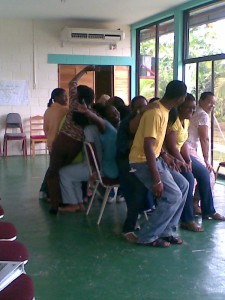A client asked me to design and deliver a workshop as part of a staff training programme. During one of the sessions a participant said she didn’t think the ideas presented would work, because that’s not the way she’s accustomed doing things. And anyway, “My manager has not complained. In fact, I scored quite well on my latest assessment.” A few others agreed with her.
Without compromising my confidentially agreement with the employer I explained that in today’s constantly shifting market-space, the company wanted to make sure it had the flexibility and agility to handle whatever might be ahead. A staff training programme was set up when managers recognised it was time not only to upgrade skills, but also to explore new ways of thinking and doing. I later realised that breaking the ice would have been much easier had the employer communicated this to the staff before the training began. But that’s a whole other subject.
[perfectpullquote align=”left” bordertop=”false” cite=”” link=”” color=”” class=”” size=”18″]If it’s not broke don’t fix it[/perfectpullquote]That’s a familiar quote that has all but become a mantra in many businesses. In today’s world such thinking can lead to inertia. Okay, there are occasions when it can be useful to maintain systems just the way they are, but too much time in the comfort zone can cause you to zone out. With concern in recent years over the level of risk exposure in the financial sector, it’s no surprise that many businesses feel justified in playing it safe. But playing it safe can endanger progress.
There was a time, not too long ago, when a business would undergo major change followed by a long period of stability. The pattern would repeat after a number of years. In successful businesses these days, there are likely to be several changes taking place simultaneously with little or no gap between major change initiatives.
One of the points I remember from an intensive week-long manager’s training course some years back was the importance of flux. The course was “Managing Organisational Transformation.” The trainers explained that if you want to walk you can’t keep both feet on the ground at the same time. You are always in a state of transition if you are moving. Successful businesses adopt a similar model. While having one foot steady and grounded, they make sure the other foot is ready to lead off in the direction of the most favourable opportunity. Such enterprises, the trainers told us, are never static, always in transition they keep a close eye on trends and are primed to take advantage of a new wave and ride it.
Richard J. Leider, founder and a partner in The Inventive Group, says the core of the change process is listening and hearing. “Listening is absolutely essential to change” says Leider. That may explain why change is such a hit and miss undertaking for many organisations. [perfectpullquote align=”right” bordertop=”false” cite=”” link=”” color=”” class=”” size=”15″]Listening is not an easy art to develop and if managers do listen, are they willing to actively encourage staff to speak up and contribute ideas for improvement? [/perfectpullquote]
Employees tend to be more productive when they feel involved in what’s going on and not just a cog in the machine. If they know their managers are open to new ideas, there’s a good chance the workforce will not just be following orders, but actively thinking about more effective, efficient ways of working. That has to be good for everyone, especially the customer.
However, employees often complain that original thinking is neither welcomed nor rewarded. If you question the system you are likely to be branded a troublemaker instead of an innovator. Discouraged from displaying a questioning attitude or developing critical thinking, employees are instead encouraged to maintain the status quo and not rock the boat. This may be particularly relevant in an organisation enjoying a period of relative success. Change is unwelcome as it may upset the formula.
But if you have been doing things one way for many years, that doesn’t mean you’ve been doing things the best way. Is it possible that your way could be made a little more efficient?
It’s often said that the biggest enemy of change is success. The more you think you know the less open you are to new information and ideas that could really take you to a new level. Dr. Robert Kriegel, one time athletic coach and author of “If it ain’t broke… break it”, says it’s sometimes useful to think like a beginner. “Experts tend to rely on yesterday’s solutions to solve today’s problems. Beginners don’t have such preconceived notions; they approach new situations with curiosity and open minds” says Kreigel.
Regardless of how far ahead we may think we are, it’s vital to keep our eyes open and welcome change when required, otherwise we may slip into a coma of false security as the competition glides past.
First published in Business Journal Magazine



 It’s quite appropriate to accept the things beyond your control and not get overly upset about them, but it’s something else entirely to resign yourself to situations because of fear or laziness.
It’s quite appropriate to accept the things beyond your control and not get overly upset about them, but it’s something else entirely to resign yourself to situations because of fear or laziness.
 Chatting with some friends recently one said, “Have you noticed these days the world is moving in two directions? The negativity or darkness seems to be increasing, while humanity’s thirst for peace, love and harmony, the positive, is also increasing.”
Chatting with some friends recently one said, “Have you noticed these days the world is moving in two directions? The negativity or darkness seems to be increasing, while humanity’s thirst for peace, love and harmony, the positive, is also increasing.” Some people take life so seriously they’re not able to see the natural humour and joy in what sometimes appear to be hopeless situations.
Some people take life so seriously they’re not able to see the natural humour and joy in what sometimes appear to be hopeless situations.
 A few weeks ago I walked into a solid glass door. It was thick and it hurt. I was left with a mild concussion.
A few weeks ago I walked into a solid glass door. It was thick and it hurt. I was left with a mild concussion. Earlier this month I celebrated a birthday. Feels good to be around. When I was a teenager, the numbers associated with my age today seemed massive. It was like science fiction thinking so far ahead.
Earlier this month I celebrated a birthday. Feels good to be around. When I was a teenager, the numbers associated with my age today seemed massive. It was like science fiction thinking so far ahead.
